
Insect Conservation and Diversity
Scope & Guideline
Elevating Knowledge in Insect Conservation
Introduction
Aims and Scopes
- Insect Conservation:
Research dedicated to understanding the factors leading to the decline of insect populations, including habitat loss, climate change, and pollution, as well as methods for their conservation. - Biodiversity Assessment:
Studies aimed at assessing and documenting the diversity of insect species across different ecosystems, utilizing both traditional and modern techniques such as DNA barcoding and ecological modeling. - Ecological and Evolutionary Dynamics:
Exploration of the ecological interactions among insect species and their environments, including studies on species adaptation, evolutionary genomics, and community dynamics. - Urban Ecology:
Research focusing on how urbanization affects insect diversity and conservation, examining the role of green spaces, urban habitats, and human-wildlife interactions. - Management and Restoration Practices:
Development and evaluation of conservation management strategies and restoration practices aimed at enhancing insect habitats and populations.
Trending and Emerging
- Climate Change Impacts:
An increasing number of studies are addressing how climate change affects insect populations and distributions, emphasizing the need for adaptive management strategies in conservation. - Genomic Techniques in Conservation:
The use of genomic tools for assessing genetic diversity and population structure is gaining traction, allowing for more informed conservation decisions and strategies. - Urban Biodiversity:
Research focusing on the conservation of insect species in urban landscapes is on the rise, driven by the need to understand how urbanization impacts biodiversity and ecosystem services. - Community Ecology and Ecosystem Services:
There is a growing emphasis on the role of insect communities in ecosystem functioning and the services they provide, such as pollination and pest control, which is crucial for sustainable management. - Citizen Science and Public Engagement:
Papers highlighting the role of citizen science in monitoring insect populations and engaging the public in conservation efforts are becoming more prevalent, reflecting a trend towards collaborative conservation approaches.
Declining or Waning
- Traditional Taxonomy:
There has been a noticeable decline in papers focused solely on traditional taxonomic studies, as the field moves towards integrating molecular techniques and ecological assessments to understand insect diversity. - Basic Ecological Studies:
Research that primarily describes insect behavior or ecology without direct conservation implications is becoming less prominent, possibly overshadowed by studies that link ecological findings to conservation strategies. - Single Species Focus:
Studies concentrating on single species without considering broader ecological contexts are less frequent, as there is a growing emphasis on community-level interactions and multi-species approaches.
Similar Journals
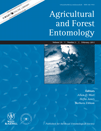
AGRICULTURAL AND FOREST ENTOMOLOGY
Advancing knowledge at the intersection of agriculture and entomology.AGRICULTURAL AND FOREST ENTOMOLOGY is a leading journal published by Wiley, focusing on the interface of entomology, agriculture, and forestry. With a robust impact reflected in its Q2 and Q1 quartile rankings in prominent categories like Agronomy and Crop Science, Forestry, and Insect Science, this journal serves as a vital platform for researchers and professionals seeking to advance their understanding of insect impacts on agricultural and forest ecosystems. Since its inception in 1999, it has provided a comprehensive collection of high-quality research, facilitating interdisciplinary discussions and innovations in pest management, biodiversity, and sustainable practices. Although it does not currently offer Open Access, the journal continues to uphold rigorous peer-review standards, ensuring that published works maintain a profound scientific value. As of 2023, its Scopus rankings further signify its prominence in the field, engaging a global audience keen on addressing the pressing challenges faced within agricultural and forest sciences.

Bulletin de la Societe Linneenne de Lyon
Championing Original Research in Natural SciencesBulletin de la Societe Linneenne de Lyon is a distinguished journal in the field of natural sciences, published by Société Linneenne de Lyon, a renowned institution in the heart of France. This journal, bearing the ISSN 2554-5280, serves as a crucial platform for the dissemination of high-quality research articles, reviews, and discussions that focus on the diversity of life and its conservation, reflecting the foundational principles established by Carl Linnaeus. Although it operates under a traditional access model, the bulletin significantly contributes to the advancement of botany, zoology, and ecology by providing a forum for original research that often garners attention from scholars and practitioners alike. With a commitment to fostering collaboration and dialogue among researchers, this journal is positioned as a vital resource for anyone dedicated to understanding the complexities of biological sciences and systems. The impact of its publications is amplified by its ties to a prominent academic community, making it an essential read for professionals, researchers, and students eager to stay informed on the latest developments in their fields.

REVISTA COLOMBIANA DE ENTOMOLOGIA
Pioneering Insights into Colombia's Insect DiversityREVISTA COLOMBIANA DE ENTOMOLOGIA, published by the SOC COLOMBIANA ENTOMOLOGIA-SOCOLEN, serves as a vital platform for disseminating research in the field of insect science. With an ISSN of 0120-0488, the journal has established itself as a key resource for entomologists, agricultural scientists, and biodiversity researchers, focusing on the ecology, taxonomy, and behavior of insects within the Colombian context and beyond. Despite its Q4 ranking in 2023, REVISTA COLOMBIANA DE ENTOMOLOGIA strives to enhance its impact within the academic community, offering a space for innovative studies and reviews that aim to advance the understanding of insect-related phenomena. As a publication addressing critical concerns in agricultural and biological sciences, it invites contributions that explore new methodologies and findings relevant to the insect world. Although it does not currently offer Open Access options, the journal's growth from 2004 to 2024 reflects its commitment to evolving with the needs of its readership and contributors, making it an essential reference point for students and professionals alike interested in entomological research.
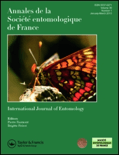
ANNALES DE LA SOCIETE ENTOMOLOGIQUE DE FRANCE
Pioneering research in ecology and entomology.ANNALES DE LA SOCIETE ENTOMOLOGIQUE DE FRANCE, published by Taylor & Francis Ltd, is a prestigious journal that focuses on the dynamic field of entomology, offering a platform for the dissemination of innovative research related to insect science and ecological systems. With an increasing impact factor and notable quartile rankings (Q2 in both Ecology, Evolution, Behavior and Systematics, and Insect Science), the journal serves as a vital resource for researchers, professionals, and students alike, stimulating advances in our understanding of insect biology and its implications for broader ecological contexts. Although it is not an Open Access journal, it boasts a strong reputation within the academic community, as evidenced by its significant Scopus rankings and a commitment to high-quality peer-reviewed content. With its extensive historical archive since 1988 and a continuous publication schedule through 2024, ANNALES DE LA SOCIETE ENTOMOLOGIQUE DE FRANCE remains an essential reference for those engaged in the study of entomology and related ecological fields. For more information, visit the publisher's site at Taylor & Francis Ltd.

Insect Systematics and Diversity
Unraveling the Mysteries of Entomological ScienceInsect Systematics and Diversity, published by Oxford University Press Inc., stands as a leading journal in the realm of entomological research, boasting an impressive impact factor driven by its rigorous peer-review process and high-quality publications. With a focus on animal science, zoology, developmental biology, and insect science, the journal is expertly positioned to address the complexities of insect evolution, behavior, and ecological interactions. Since its inception in 2017, the journal has rapidly gained recognition, achieving Q1 quartile ranks in multiple categories, including Insect Science and Ecology, Evolution, Behavior, and Systematics, indicating its relevance and prestige within the academic community. Researchers, professionals, and students alike will find invaluable insights, methodologies, and discussions that propel the understanding of insect diversity and systematics, ensuring the journal is an essential resource for advancing knowledge in this dynamic field. The journal provides access to a wealth of information, fostering collaboration and engagement within the global scientific community.
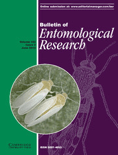
BULLETIN OF ENTOMOLOGICAL RESEARCH
Pioneering Research at the Nexus of Entomology and HealthBULLETIN OF ENTOMOLOGICAL RESEARCH, published by Cambridge University Press, is a prestigious journal that has been at the forefront of entomological research since its inception in 1910. With an impressive track record extending through to 2024, this journal serves as a vital platform for advancing knowledge in various related fields, notably Agronomy and Crop Science and Insect Science, where it ranks in the top quartile (Q2) and maintains a commendable position within the Scopus rankings in its categories. Notably, its contributions also intersect with Medicine in a broader scope, fostering interdisciplinary insights. While access to the journal content is not classified as 'Open Access,' its rigorous peer-reviewed articles are crucial for researchers, professionals, and students seeking to enhance their understanding of entomology and its applications in agronomy and beyond. The journal's impact is reflected in its notable percentile rankings, emphasizing its relevance and influence in the academic community. Located at the heart of the UK, the BULLETIN OF ENTOMOLOGICAL RESEARCH continues to be an essential resource for those dedicated to the study and understanding of insects and their impacts on agriculture and health.

JOURNAL OF INSECT BEHAVIOR
Unraveling the Mysteries of Insect InteractionsJOURNAL OF INSECT BEHAVIOR, published by SPRINGER/PLENUM PUBLISHERS, stands as a pivotal platform for disseminating cutting-edge research in the fields of insect science and behavioral ecology. Since its inception in 1988, the journal has continuously contributed to our understanding of insect behavior and its ecological implications, boasting an impressive range of studies that address both evolutionary and systemic perspectives. With its current rankings placing it in the Q3 quartile for both Ecology, Evolution, Behavior and Systematics and Insect Science categories, the journal is positioned within the competitive landscape of agricultural and biological sciences, offering insightful contributions to practitioners and academics alike. Although currently not an open-access journal, it ensures wide accessibility through numerous academic institutions and libraries, thereby fostering global collaboration. Researchers, professionals, and students are encouraged to engage with the rich array of articles that not only advance theoretical knowledge but also inform practical applications in managing insect populations and preserving biodiversity.
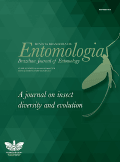
REVISTA BRASILEIRA DE ENTOMOLOGIA
Innovating research for a deeper understanding of insects.REVISTA BRASILEIRA DE ENTOMOLOGIA, published by the SOCIEDADE BRASILEIRA DE ENTOMOLOGIA, is a premier open-access journal dedicated to the field of insect science, particularly within the context of Brazil's rich biodiversity. Since its inception in 2002, this journal has aimed to provide a platform for the dissemination of high-quality research, covering various aspects of entomology including behavior, ecology, and the impact of insects on agriculture. With an ISSN of 0085-5626 and an E-ISSN of 1806-9665, it is indexed in Scopus, ranking in the 39th percentile among its peers in the insect science category. Operating out of Curitiba, Brazil, and with emerging recognition beyond national borders, the journal reflects an ongoing commitment to advancing the science of entomology through rigorous peer-reviewed articles. By making its content freely accessible, REVISTA BRASILEIRA DE ENTOMOLOGIA encourages widespread engagement and collaboration among researchers, professionals, and students alike.
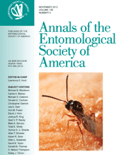
ANNALS OF THE ENTOMOLOGICAL SOCIETY OF AMERICA
Elevating Knowledge in Agricultural and Biological SciencesANNALS OF THE ENTOMOLOGICAL SOCIETY OF AMERICA is a premier journal dedicated to advancing the field of insect science, published by Oxford University Press. With an impressive impact factor and classified in the Q1 quartile for its category, this journal ranks among the top publications in agricultural and biological sciences, specifically within insect science, positioned at #28 out of 181, indicating its significant influence and high-quality research contributions. The journal aims to disseminate original research, comprehensive reviews, and groundbreaking findings that enhance our understanding of entomology, spanning across ecological, evolutionary, and applied segments. With a consistent publication history since 1938, researchers, professionals, and students will benefit from the wealth of knowledge presented in its pages. Although the journal does not currently offer open access, it remains a vital resource for those seeking to stay at the forefront of entomological research and innovation.
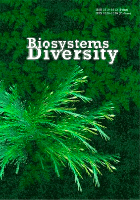
Biosystems Diversity
Empowering Research for a Sustainable FutureBiosystems Diversity is an esteemed open access journal published by the Oles Honchar Dnipro National University since 2009, based in Ukraine. Focusing on a wide array of topics within the fields of Ecology, Evolution, Behavior, and Systematics, the journal aims to foster the dissemination of cutting-edge research and innovative methodologies in understanding biodiversity and ecological interactions. With its ISSN 2519-8513 and E-ISSN 2520-2529, Biosystems Diversity has seen a consistent growth trajectory, earning a Q3 category for Ecology and a Q4 classification for Ecology, Evolution, Behavior and Systematics as of 2023, reflecting its dedication to high standards of scholarly excellence. The journal's rankings in Scopus solidify its relevance in the academic community, providing researchers and practitioners with vital insights into contemporary environmental challenges. As it converges towards its 2024 target, Biosystems Diversity continues to empower scientists, students, and professionals alike to explore new dimensions in the study of biological systems, offering crucial open access options for broader reach and engagement.